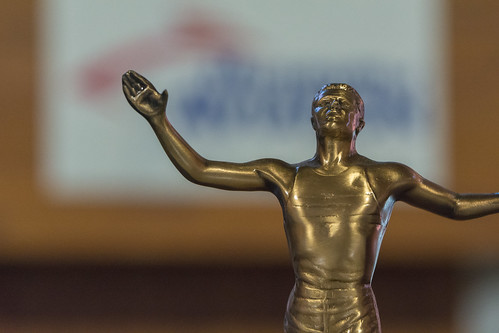marathon /MAIR-ə-thon/. noun. A foot race of 26 miles, 385 yards. Abstractly, a difficult, arduous task.
The marathon we know today as a 26.219 mile race (or to be even more precise way too long) has tangled historical roots based on two ancient stories:
Herodotus, known as “The Father of History”, tells the story of Athenian Pheidippides, who was sent to Sparta in 490 BCE to request help in battling invading Persian forces on the plain of Marathon in Northeastern Greece. The name marathon is a “toponym”: “marathon” being greek for “fennel” or “fennel-field”. According to Herodotus, Pheidippides covered what Google Maps tells me is nearly 138 walking miles in two days…returning the same way with the unfortunate news that the Spartans were too busy with religious ceremonies to help.
Couch potatoes like myself might find the story in Herodotus unbelievable, but in 1982 five Royal Air Force members re-created the mythical run, following a 152.85 mile route they dubbed the Spartathlon. Three of them made it in less than forty hours…and the current record holder did so in under 22!
Though the ancient Athenians were victorious, Pheidippides wasn’t so lucky. According to Plutarch, in the 2nd story that inspired today’s marathon, Pheidippides was sent from Marathon to Athens to announce the Athenian victory over the much greater Persian forces. He ran the 22 miles non-stop, bursting into the assembly of archons proclaiming “chairete nikomen” or “rejoice, we have won!” and then dropped dead on the spot.
The contemporary marathon was established as part of the first modern Olympic games in Athens 1896, in part because of the obvious resonance of place, but also because Robert Browning’s poem “Pheidippides” had become quite popular. A poem achieving such status in pop-culture sounds as incredible to me as the story of Pheidippides’ deadly run, but it’s true. Browning immortalized the doomed runner who:
…flung down his shield,
Ran like fire once more: and the space ’twixt the Fennel-field
And Athens was stubble again, a field which a fire runs through
Till in he broke: “Rejoice, we conquer!” Like wine through clay,
Joy in his blood bursting his heart, he died—the bliss!
For those first modern Olympic games, a 25 mile route from the Marathon Bridge to the Olympic stadium was used. In 1908 the length of the race was intended to be standardized at 26 miles exactly, but the original route from Windsor Castle to White City Stadium was extended by 385 yards at the request of Queen Alexandra. Alexandra, who bore the delicious titles of Queen consort of the United Kingdom and the British Dominions, and Empress consort of India, wanted the royal children to be able to watch the start of the race from their nursery. So in the Very British Manner that has foisted feet, pounds, roods and furlongs upon we wise Metric System advocates, this has remained the standard marathon distance to this day.
Since then, the marathon has provided a forum for demonstrations of amazing athleticism. In 2011, Belgian runner Stefan Engels ran a marathon every day for a year and in 2016, Indian runner Fauja Singh completed the Mumbai Marathon not long after celebrating his 104th birthday. And the Queen Alexandrian length has spawned astonishing, longer (and perhaps a little crazy) races like the Badwater Ultramarathon tracing a 135-mile route from California’s Death Valley, the lowest point in North America, through three mountain ranges, to the portal to Mount Whitney, the highest peak in the lower 48. Or the Marathon of the Sands, in which participants must carry their own food, venom packs and distress flares while essentially running six marathons in six days through the Sahara desert.
And, to bring us back to the world of words, the marathon has also given us the gift of what the OED calls “barbarous extractions,” in which would-be wordsmiths have mistaken the latter part of the word for a suffix meaning “long” and grafted it onto other familiar words to give us walkathons, talkathons, readathons, danceathons, hackathons and scores of other occasionally hideous linguistic chimeras.
Links & Meanders
- Multiple Equinox Marathon winner Matias Saari’s surprisingly fascinating book on the history of the legendary marathon held right here in Fairbanks, Alaska, THE EQUINOX:
Alaska’s Trailblazing Marathon. - The story of Pheidippides in the Histories of Herodotus.
- The story as told by Plutarch in “De gloria Atheniensium” (“The Glory of the Athenians”).
Notes & Quotes
Why do marathon losers often feel better than their more winning counterparts? Robert Sapolsky explains in his book Behave:
This is a rich literature showing the subtleties of the human psyche. The winning effect on testosterone is lessened in circumstances where people feel like they won by luck or where, despite winning, they feel like they underperformed. In contrast, the effect is enhanced among people who went into the competition having the strongest psychological motives for domination. Finally, testosterone levels can rise robustly in “losers” who nonetheless performed far better than they anticipated. Thus one might see testosterone levels rise after a marathon in a guy who came in at the back of the pack but is triumphant because he was sure he was going to drop dead halfway through, and may decline in the guy who comes in third but was expected to win. We all belong to numerous hierarchies, but some of the most powerful are the ones in our heads based on our internal standards. (Robert M. Sapolsky, Behave)
Also, Thomas Pynchon’s verbification is delightful:
The kids ran thumping around, eating nonstop, the adults drank, took drugs, hugged, wept, had insights, marathoning through the night till breakfast, nothing ever resolved, false reconciliation abounding. (Thomas Pynchon, Vineland)





Leave a Reply